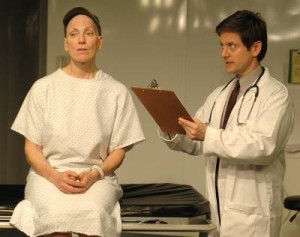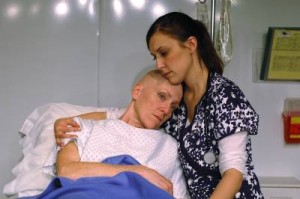
Margaret Edson’s Pulitzer Prize winning Wit is a play one approaches with a certain
trepidation. Its subject matter is, after all, illness and death. Not a likely candidate
for an “entertaining” evening of theater. Yet somehow, miraculously, Wit is indeed
an entertaining, unexpectedly funny (it has more laughs than many a comedy),
and ultimately transformative evening of theater.
Under Robert Mammana’s inspired direction, and featuring a lead performance
by Karesa McElheny which rivals her multiple award-nominated star turn in
Elizabeth Rex, Wit is likely to appear on many “Best of” lists for 2008.
McElheny is Professor Vivian Bearing, Ph.D., John Donne scholar, diagnosed with
Stage 4 metastatic ovarian cancer. (“There is no Stage 5,” she tells us.) As Vivian
undergoes a debilitating 8-month treatment of experimental chemotherapy, she
recalls her childhood, her teaching career, and, at one point, the moment she
received her diagnosis from a business-only MD, sorely lacking in beside manner.
Vivian: I will never forget the time I learned I had cancer.
Dr.: You have cancer.
Vivian: (with a dry smile) See. Unforgettable.
Ever the professor, Vivian is wont to take a dry marker from her hospital gown and
write on the walls of the hospital room set, diagramming sentences and discussing
the difference between “I feel good” and “I feel well” as a response to the
inevitable “How are we today?” (Vivian’s preferred reply is a simple “Fine,” which
she writes down in all caps.)
Vivian tells us that John Donne’s salient feature is wit, and Edson’s writing is witty
indeed, as when poetry expert Vivian talks about being visited by an enthusiastic
team of doctors early on in her treatment. “The attention was nice for the first five
minutes,” she tells us, then adds, “Now I know how a poem feels.”
As Wit unfolds, we see in flashbacks that Professor Vivian had been as unfeeling
towards her students as her doctors are to her now. When a student comes
begging for an extension on a paper’s deadline, Vivian tells him coldly, “Do what
you will. The paper is due when it is due.” Later, as she begins to see her life in a
much different light, Vivian begins to reflect on time (“It goes so slowly and yet it is
so scarce.”) and the paradox of a treatment which “imperils my own health.”
McElheny is simultaneously perky and ironic as she takes us along on her journey.
At one point, discussing the often annoying young research MD assigned to her
case, a former student to whom she had given an A- and who has now left her
supine, legs spread for a pelvic examination in order to go get a female to be in
the room with him per hospital regulations, Vivian spits out, “I wish I’d given him an
A!” Later, having paused to “barf my brains out,” she comments wryly, “My
vocabulary has taken a turn for the Anglo Saxon.” In McElheny’s gifted hands, we
see the fear and pain behind the smiles as Vivian’s cancer spreads and her health
and spirit deteriorate. Because Vivian’s breaking of the fourth wall continues
throughout the play, McElheny has the daunting task of moving back and forth
between scenes of excruciating suffering followed immediately by sardonic
remarks to the audience about her condition, something at which she succeeds
admirably. McElheny gives us a proud woman reduced to submission by her illness,
yet somehow never losing her sense of irony, and she reveals the vulnerability
behind the bravado. It is a tour de force performance.
Two actors stand out especially in supporting roles.
Paul Denniston’s own ingratiating persona makes him the ideal choice to play Dr.
Jason Posner, uncomfortable dealing with patients as in the scene where he
nervously keeps repeating “Just stay calm. Very call. Stay calm” ad infinitum,
when this is advice he clearly needs to be giving himself. Casting a colder actor in
the role would have made Jason insufferable. Denniston’s own good nature lets
us see his awkwardness in an empathetic light. Denniston is particularly fine in a
scene where Jason discusses with Vivian the way that cancer cells “replicate
forever.” “Cancer is awesome,” he declares, his eyes bright with wonder.
Likewise, Aubrey Saverino’s girl-next-door loveliness and warmth are perfect for
Nurse Susie Monahan, the one person in the hospital who sees Vivian as a human
being and not as a research guinea pig, and in fact the only caring face Vivian
sees. (No friends visit Vivian.) Saverino’s part at first seems to be a minor one, but
in a scene where Susie caringly explains what Vivian’s options are should her heart
stop, Susie’s pivotal role as the voice of humanity becomes evident. In a scene of
great power involving a code blue emergency, Saverino is utterly compelling as a
warrior for Vivian’s dignity and self-determination.
Shelly Kurtz does very good work as Vivian’s chief physician, a man who can reveal
a terminal patient’s diagnosis to her as coolly as Vivian would announce a
homework assignment to her students. Elly Jaresko and Sean Faye have smaller
roles as technicians, students, and research fellows, but each has at least one
scene in which to shine. Marbry Steward completes the cast as Vivian’s very
refined professor of poetry. Steward’s visit to a moribund McElheny is moving
indeed.
Artistic director August Viverito contributed Wit’s fine set and superlative lighting
design. The walls of Vivian’s hospital room are made of the same material as a
classroom whiteboard, allowing Vivian to write on them as she would in one of her
classes. (This was apparently one of director Mammana’s inspirations, not in the
original script.) Vivirito’s lighting subs beautifully for an x-ray machine and an MRI
chamber, takes us effortlessly from present to past, and reveals Vivian’s increasing
sense of isolation. The play’s final moment is a brilliant mix of Vivirito’s lighting and
a fearless McElheny’s performance.
Like The Shadow Box, Wit is a play I had avoided seeing in the past for fear that
the experience would be “too much” to handle. It is indeed difficult to watch
someone in Vivian’s situation (There but for the grace of God…), but rest assured.
There is far too much humor for Wit to be dubbed “a downer,” and so much talent
involved in this production that the result is an hour and a half of unforgettable
must-see theater.
The Chandler Studio Theatre Center, 12443 Chandler Boulevard, North
Hollywood.
www.theprodco.com
–Steven Stanley
January 11, 2008




 Since 2007, Steven Stanley's StageSceneLA.com has spotlighted the best in Southern California theater via reviews, interviews, and its annual StageSceneLA Scenies.
Since 2007, Steven Stanley's StageSceneLA.com has spotlighted the best in Southern California theater via reviews, interviews, and its annual StageSceneLA Scenies.







 COPYRIGHT 2024 STEVEN STANLEY :: DESIGN BY
COPYRIGHT 2024 STEVEN STANLEY :: DESIGN BY